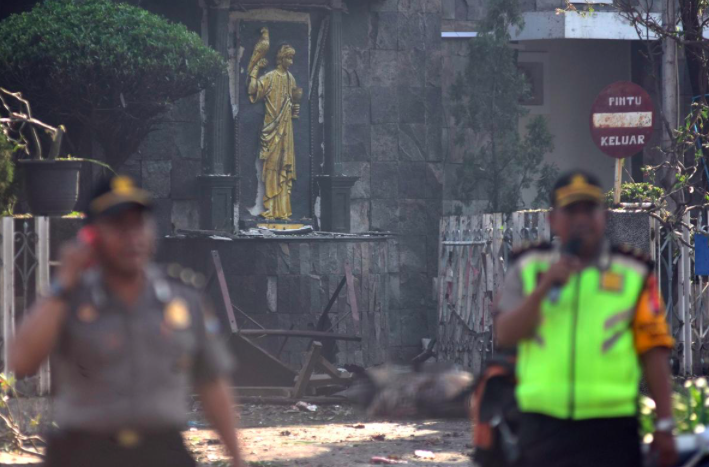Indonesia's family suicide bombers represent spiritual forces of evil
There's something particularly chilling about the suicide bomber.
In Lord Macaulay's rousing Victorian poem Horatius, the hero asks to be given the honour of holding a crucial bridge in spite of the risk: for 'how can man die better/ Than facing fearful odds,/ For the ashes of his fathers,/ And the temples of his Gods?' But believing you're going to die for a noble cause while fighting as hard as you can to stay alive is different from deliberately killing yourself to take the enemy with you. Even the latter, it might be argued, has biblical warrant: Samson did it, after all. But he was utterly defeated and hopeless, 'eyeless in Gaza, at the mill with slaves', with nothing to live for; you can see how that might have worked.

The suicide bombers of our days are different. They don't die out of love, but out of hate. And they have plenty to live for, it's just that they've been taught to believe death is better.
But those who blew themselves up in two separate series of attacks in Surabaya, Indonesia yesterday and today – the first aimed at churches – have plumbed a deeper darkness still. They involved whole families, parents and children. Yesterday a father rammed a car full of explosives into the door of a church while his wife and two daughters, aged 12 and nine, attacked another. Their sons, aged 16 and 18, attacked another holding a bomb on a scooter.
Today, another family carried an eight-year-old girl into a suicide bomb attack on a police station. It's believed the child survived.
What did they tell them? It's impossible to believe the children thought they were out for an ordinary ride. Children, up to a certain age, believe what they're told; if the story was that it wouldn't hurt and that they were going to heaven, perhaps they believed it. What about the older ones? Family loyalty is a powerful tool. There are all sorts of complicated dynamics. Perhaps they bought into the Islamist mythology. Perhaps they just couldn't bear to be parted. We don't know, and probably, by the nature of the case, we never will.
But what twists these cases into a deeper evil is the element of betrayal. Children have an absolute right to their parents' protection, because they are absolutely vulnerable. That's why child abuse is so abhorrent to us, and that's why we are shocked to our core by a case like this. They died because no one would have expected a child to be involved in a suicide bombing.
We cannot, if we're honest, fully understand it. 'Can a mother forget the baby at her breast and have no compassion on the child she has borne?' God asks in Isaiah (49:15). It's a rhetorical question – but the answer here seems to be, 'Yes'.
However, that's not the whole story. What's so tragic about this is that these families appear to have acted out of a perverted kind of love. They really seem to have believed that God approved of what they did. Their children were a grim sacrifice to a bloodthirsty deception.
And this is not quite metaphorical language. The Bible is horrified by child sacrifice, which was practised in the ancient world in that region. The story of the aborted 'sacrifice' of Isaac in Genesis 22 can be read as a warning against it.
'You shall not give any of your offspring to offer them to Molech, nor shall you profane the name of your God; I am the LORD,' says Leviticus 18:21.
Children are precious. They are not to be used as a means to an end, sacrificed on the altar of fanatics in order to achieve a desired result. And when people stop worshipping God and start worshipping an ideology based on hate and death, that's what happens: even their own children are disposable.
Quite rightly, the authorities in Indonesia are concerned about security. But there is no 'security' while there's a larger battle going on. That is, as Paul says, 'against the rulers, against the authorities, against the powers of this dark world and against the spiritual forces of evil in the heavenly realms' (Ephesians 6:12). It's as old as time, and it's not over yet.
Follow Mark Woods on Twitter: @RevMarkWoods











